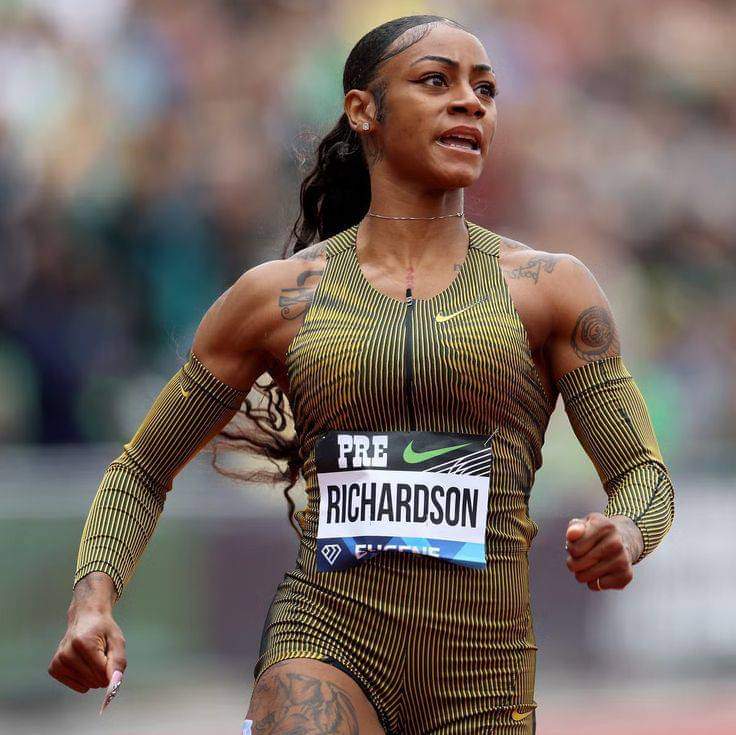Sha’Carri Richardson, known for her electrifying speed and vibrant personality, is no stranger to the limelight. Recently, however, she found herself at the center of discussions not only about her athletic prowess but also her personal life. Richardson’s attendance at an Atlanta Falcons game against the Dallas Cowboys ignited social media chatter that extended beyond sports.
The Falcons’ official Instagram page featured a post calling Richardson the “fastest woman in the world,” a designation that quickly became a point of contention among fans and track enthusiasts. While Richardson holds the title of world champion in the 100m, others argue that the title of “world’s fastest woman” belongs
to the Olympic gold medalist Julien Alfred, following her recent victory in Paris. The title “fastest woman” is unofficial but symbolic, and fans on social media were quick to debate what truly qualifies an athlete to bear it.
Some fans defended Richardson, pointing to her impressive world title win and highlighting her track achievements. Others insisted that Alfred’s Olympic gold represents the ultimate in track and field, symbolizing the pinnacle of success. This debate speaks to the broader conversation about what it means to be the “best” in sports: is it defined by consistent wins, a world championship, or an Olympic gold? The Falcons’ post, likely intended as a compliment, inadvertently reopened this complex discussion.
Richardson’s appearance at the game stirred interest for another reason as well. She was spotted with fellow track star Christian Coleman, sparking rumors of a possible romance between the two. The duo had previously been seen together at other events, which led to speculation among fans. Coleman added fuel to the rumor mill by sharing an Instagram story from the game, which Richardson later reposted. For followers of both athletes, the idea of a potential track power couple is an exciting prospect.
Coleman himself is an accomplished sprinter, having held the title of the world’s fastest man at one point. The parallels between Coleman and Richardson’s careers, as well as their shared passion for track and field, make them a fascinating pairing for fans. Coleman, like Richardson, has faced both praise and challenges in the public eye, making them a compelling and relatable duo. For many fans, the idea of two highly competitive, spirited athletes forming a connection is intriguing, adding a new dimension to Richardson’s already fascinating public persona.
Richardson’s journey to the top has been filled with notable highs and lows. She first captured the public’s attention during the U.S. Olympic trials in 2021, where she wowed fans not only with her speed but with her striking look, including colorful hair and a bold style. Unfortunately, she was later suspended from the Tokyo Olympics due to a controversial positive test for cannabis. Although the incident kept her from competing, Richardson handled it with resilience and returned to claim her world championship title in the 100m, proving her talent and determination.
As Richardson has navigated both her athletic and public image, she has become an example of resilience and confidence. Her return to the track after her suspension—and her subsequent achievements—have cemented her status as a role model for those who admire her perseverance and refusal to let setbacks define her career. For many, Richardson’s achievements on the track symbolize not only her physical abilities but also her mental toughness, a quality that has endeared her to a global fanbase.
In today’s sports culture, public perception is powerful. Richardson’s fans see her as more than just a track athlete; she’s a cultural icon who represents resilience, individuality, and authenticity. Her popularity extends far beyond track and field, with fans who are drawn to her personality and unapologetic approach to life. Social media has allowed her to connect directly with fans, where she shares glimpses of her training, personal insights, and updates on her journey.
The recent NFL appearance also underscores the growing trend of athletes as public figures who resonate beyond their sport. Athletes today, like Richardson, face the dual challenge of performing on the field and navigating the expectations of a highly engaged audience. Public titles like “fastest woman” become symbols that fans rally behind, but they also generate debate, showing how much influence fans and public perception hold in shaping an athlete’s legacy.
Richardson’s legacy will likely be defined not just by titles and medals but by her impact on fans and her influence on the sport. Her journey has highlighted the complexities of fame in modern sports, where athletes often find themselves managing not only their professional achievements but also the public’s view of them. The ongoing debate about Richardson’s “fastest woman” title reflects how powerful words and public sentiment can be, adding another layer to her career.
Whether or not Richardson is the “world’s fastest woman” in everyone’s eyes, her story is one of resilience and determination. She continues to be a powerful presence in sports, navigating fame, competition, and public life with unwavering confidence.

